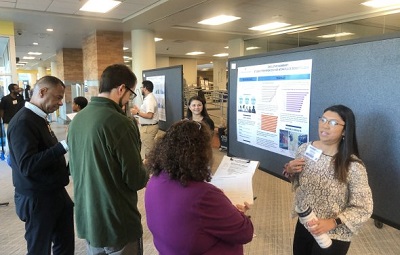Measuring HIV-1 Gag-specific Fecal IgA in Vaccinated Mice Infected with Schistosoma mansoni
Description/Abstract/Artist Statement
Vaccines are essential for maintaining public health and preventing the spread of disease. Currently, there is no effective vaccine for HIV and developing a vaccine for HIV could contribute to controlling the spread of the disease. Chronic schistosomiasis, a disease caused by infection with parasitic worms of the genus Schistosoma, is co-endemic with HIV in sub-Saharan Africa. Chronic schistosomiasis can bias the immune system towards a T-helper 2 (Th2) response. Th2 responses result in the increased production of antibodies, such as immunoglobulin A (IgA), that constitute the humoral immune response to a pathogen. IgA secreted from mucosal membranes, such as the GI tract, is important in protecting against sexually transmitted infections like HIV. The experimental groups for this study varied by Schistosoma mansoni infection: one group was infected with S. mansoni and the other group remained uninfected. Both experimental groups were immunized using Lm-Gag, a vaccine for the HIV group specific antigen (Gag), which is integrated into the chromosome of Listeria monocytogenes. Fecal samples were collected before and after the Lm-Gag vaccine was administered to the mice. Total and Gag-specific fecal IgA levels were measured by enzyme-linked immunosorbent assay (ELISA). Contrary to the hypothesis, we detected lower levels of fecal IgA from mice infected with S. mansoni relative to mice uninfected with S. mansoni. Further study is required to investigate why chronic S. mansoni infection reduces detectable fecal IgA in mice.
Faculty Advisor/Mentor
Lisa M. Shollenberger
Faculty Advisor/Mentor Department
Biological Sciences Department
College Affiliation
College of Sciences
Presentation Type
Oral Presentation
Disciplines
Immunology and Infectious Disease | Immunology of Infectious Disease | Parasitology
Session Title
College of Sciences Presentations
Location
Learning Commons @Perry Library, Room 1310
Start Date
3-25-2023 12:00 PM
End Date
3-25-2023 1:00 PM
Measuring HIV-1 Gag-specific Fecal IgA in Vaccinated Mice Infected with Schistosoma mansoni
Learning Commons @Perry Library, Room 1310
Vaccines are essential for maintaining public health and preventing the spread of disease. Currently, there is no effective vaccine for HIV and developing a vaccine for HIV could contribute to controlling the spread of the disease. Chronic schistosomiasis, a disease caused by infection with parasitic worms of the genus Schistosoma, is co-endemic with HIV in sub-Saharan Africa. Chronic schistosomiasis can bias the immune system towards a T-helper 2 (Th2) response. Th2 responses result in the increased production of antibodies, such as immunoglobulin A (IgA), that constitute the humoral immune response to a pathogen. IgA secreted from mucosal membranes, such as the GI tract, is important in protecting against sexually transmitted infections like HIV. The experimental groups for this study varied by Schistosoma mansoni infection: one group was infected with S. mansoni and the other group remained uninfected. Both experimental groups were immunized using Lm-Gag, a vaccine for the HIV group specific antigen (Gag), which is integrated into the chromosome of Listeria monocytogenes. Fecal samples were collected before and after the Lm-Gag vaccine was administered to the mice. Total and Gag-specific fecal IgA levels were measured by enzyme-linked immunosorbent assay (ELISA). Contrary to the hypothesis, we detected lower levels of fecal IgA from mice infected with S. mansoni relative to mice uninfected with S. mansoni. Further study is required to investigate why chronic S. mansoni infection reduces detectable fecal IgA in mice.


